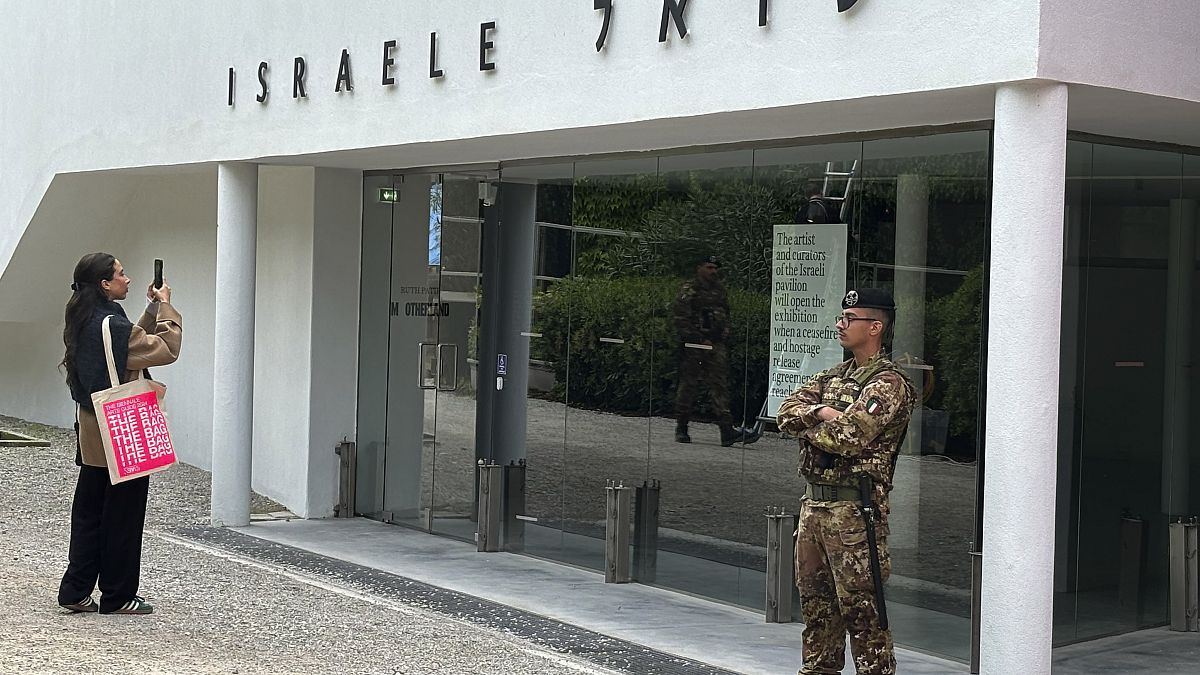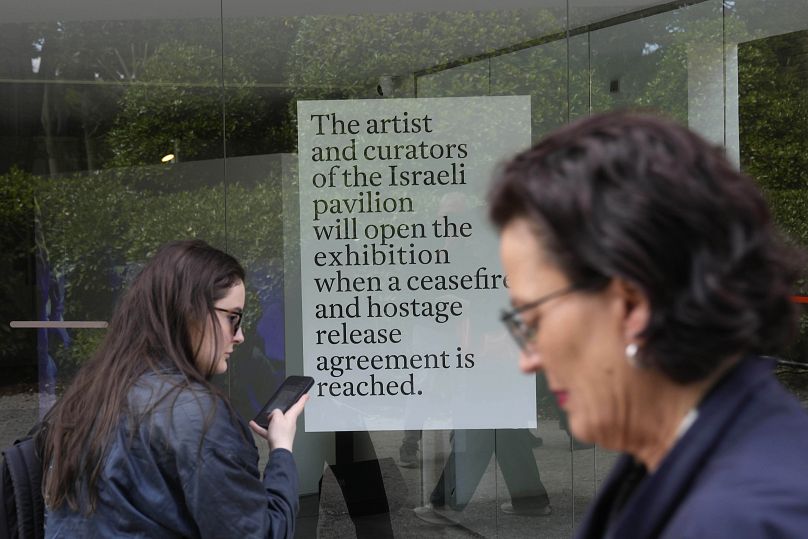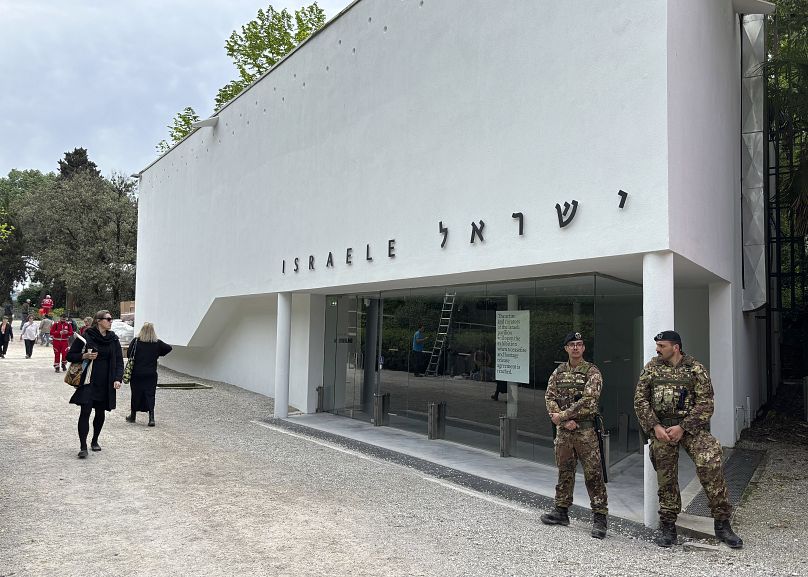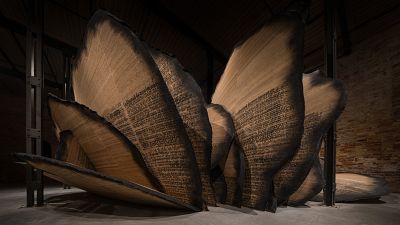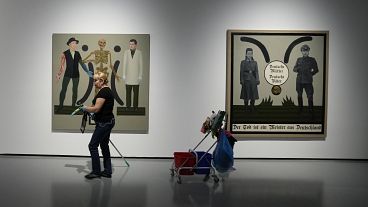Following months of public pressure, Ruth Patir, the Israeli artist exhibiting work at this year's Venice Biennale, has closed her country's pavilion until a cease-fire is reached.
Despite the Italian government’s backing in the face of petitions against Israel’s inclusion in the Venice Biennale, the nation’s nominated artist has pulled the exhibition herself.
Ahead of the Biennale’s public opening this weekend, Israel’s nominated artist Ruth Patir has confirmed that the country’s pavilion will not be open to view.
“The artist and curators of the Israeli pavilion will open the exhibition when a cease-fire and hostage release agreement is reached,” read a sign on the front of the Israeli pavilion.
Ruth Patir, the Israeli artist who had created the project ‘(M)otherland’ for the Biennale spoke to the New York Times about the decision. “I hate it,” she said, “but I think it’s important.” Despite the huge career boost the Biennale would provide to the American-born artist, Patir recognised the situation in Gaza was “so much bigger than me.”
The decision to pull the show follows a months-long public debate within the arts community about allowing the Israeli pavilion to run at the Biennale.
Following the start of the 2023 Israel-Hamas War, sparked by the 7 October attacks when Hamas fighters entered Israel and killed 1,200 people and took 240 hostages, Israeli Defense Forces have killed over 33,000 people in Gaza.
The international arts community has widely condemned Israel’s actions in reaction to the 7 October attack. In February, this condemnation reached the Venice Biennale when the ANGA (Art Not Genocide Alliance) circulated a petition demanding Israel’s exclusion from the event.
The ANGA petition received more than 17,000 signatories, including previous Biennale participants and winners of Britain’s leading arts awards, the Turner Prize.
Responding to the petition, the Italian Culture Minister Gennaro Sangiuliano had defended Israel’s right to retain its pavilion. Israel “not only has the right to express its art but has the duty to bear witness to its people precisely in a moment during which it was struck hard by merciless terrorists,” Sangiuliano said.
Sangiuliano’s Israeli counterpart, Miki Zohar said of Italy’s solidarity: “Art is a bridge between cultures and between people – and we will continue to firmly set out against attempts to boycott Israel in international forums.”
Dividing lines
Patir’s decision to not open the pavilion also comes after Mira Lapidot, who curated this year’s pavilion alongside her sister Tamar Margalit, defended the importance of Israeli artists to represent the individuality of the nation’s people instead of merely serving as a mouthpiece of the Netanyahu government.
“We all felt that after October 7 there was a polarisation in the art world,” Lapidot told Haaretz. “In contrast to the political arena, the art world pretended, or aspired, to present something more complex, ambiguous, which could contain internal contradictions – and suddenly in a single blow, the perception changed. You can either be on this side or on the other side. There is no longer a way to express empathy and a position that is more than for or against, and that fundamentally contradicts everything I understand about what art is.”
Many members of Margalit’s family have been publicly involved in Israeli movements for peace and the curator told the paper her dismay at being reduced to a nationalist spokesperson. “There are no other cases in which claims are brought against an artist for what their country does. This only exists with regard to Israel. They glue the artist and the creator to the state.”
“The decision to present in Venice is a refusal to surrender to this erasure. I probably won't convince anyone and I'm not interested in confronting those who will protest against us and against Israel,” Margalit said in response to the way Israeli artists have been de-platformed for their nationality.
Given Margalit’s comments, the decision to not run the show is seemingly one taken solely by the artist, Patir.
Until now, Patir has stayed silent as the furore around Israel’s pavilion has made headlines. The original ‘(M)otherland’ show was an exploration of motherhood and Patir’s fertility journey after she was medically recommended to freeze her eggs.
She was selected as the artist for the Biennale a month before the war began. She never pictured “that we would be in Venice in April with the hostages still in captivity, with the war still raging.” In response, they first decided to stop the party that celebrates the opening of the pavilion, before they then decided to remake the artwork in reaction to the war, before the final decision to not open.
The Biennale runs until late November, and Patir is hopeful the conditions will be reached for them to open. “I believe we will open it,” Patir said. “I believe we will.”
